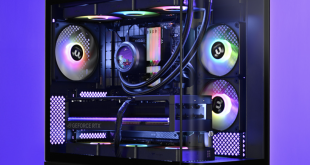We were given a break from the usual controversies surround graphics cards last week after a report surfaced surrounding Nvidia's new GeForce Partner Program. It seems that there is some concern behind the scenes about what this program represents and its potential for anti-consumerism, so today we are digging in and hoping to clear up some points of confusion.
On Thursday last week, HardOCP published a report surrounding Nvidia's previously announced GeForce Partner Program. This is a program in place for board partners to take advantage of. Members need to adhere to certain terms and conditions but in return, they gain valuable marketing support from Nvidia and other benefits, including early access to upcoming GPUs and priority access to GPU supply. Here is how Nvidia pitched the GPP to the public earlier this month:
“The GeForce Partner Program is designed to ensure that gamers have full transparency into the GPU platform and software they’re being sold, and can confidently select products that carry the NVIDIA GeForce promise. This transparency is only possible when NVIDIA brands and partner brands are consistent. So the new program means that we’ll be promoting our GPP partner brands across the web, on social media, at events and more. And GPP partners will get early access to our latest innovations, and work closely with our engineering team to bring the newest technologies to gamers.”
The folks at HardOCP managed to get a look at some of the behind the scenes documentation for the GPP to scope out the terms and conditions for board partners. The crux of the issue centres around one particular term in the contract, which states that GPP members must “have its gaming brand aligned exclusively with GeForce”. Based on this wording in the report, it sounds as if the likes of Asus ROG, MSI Gaming, or Gigabyte Aorus would need to drop AMD/Radeon and align themselves with Nvidia's GeForce brand in order to retain access to benefits like marketing support and early access to new GPUs in order to be prepared for big launches. This would have a major impact on competition in the graphics card market, and would ultimately impact consumer choice. However, the controversy has been blown out of proportion.
I contacted Nvidia this morning to try and get some clarification on the matter and I was pointed towards a post on PCGamesN, which explains the exclusivity clause a bit better. Essentially, Nvidia wants partners to have a gaming brand that is aligned with GeForce, but it isn't stopping those partners from creating a second gaming brand for AMD/Radeon graphics cards.
Graphics card companies can make as many sub-brands as they like. Hypothetically, if Asus were to sign up to be part of the GeForce Partner Program, it would need to splinter the ROG brand a bit, making a marked distinction between an Nvidia ROG card and an AMD one. A good example of this would be the Asus ROG Mars and ROG Ares graphics cards, with the former typically serving Nvidia GPUs in the past and the latter being reserved for AMD/Radeon based cards. With this distinction in place, Asus would be operating within the terms of the GPP agreement in this hypothetical scenario.
Hopefully that explanation clears up some of the confusion that has been going around over the last few days. The initial report did bring a relevant concern to light, one that was seemingly shared by sources within the industry. However, much of the controversy was based on murky messaging that needed clarification. Board partners can be part of the GPP and still sell AMD-based gaming GPUs, but they will need to invest a bit more of their marketing budget separating its gaming GPU brands to make a distinction between Nvidia and AMD lineups.
Discuss on our Facebook page, HERE.
KitGuru Says: We've been getting a lot of questions regarding the GPP story over the weekend. Hopefully this helps address the situation, if more information comes to light, we'll be sure to keep you all informed.
 KitGuru KitGuru.net – Tech News | Hardware News | Hardware Reviews | IOS | Mobile | Gaming | Graphics Cards
KitGuru KitGuru.net – Tech News | Hardware News | Hardware Reviews | IOS | Mobile | Gaming | Graphics Cards



